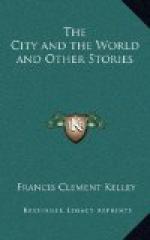“Yes, Bruce.” Mac said it sadly. “There’s the rub. I was given obligations as well as gifts, and I am taking you home with me now, instead of threshing this out in the hotel at Charlottetown, because I want you and you alone to realize that I am not just a stubborn Islander. And there is home.”
He pointed to a cottage in the field. The cottage was back from the road nearly a quarter of a mile. Mac opened the gate, led the horse through it, closed it again and climbed back into the buggy beside me. There were tears in his brown eyes.
“Is every one well?” said Mac hesitatingly. “Is everybody well—I mean of the people I knew best back there?” he asked. I knew what he meant.
“Yes, Mac, she is well,” I said, “and I know she is waiting.”
I had played my “trump card,” but Mac was silent.
The farm was typical of the Island. The kitchen door opened directly on the farmyard, and around it, at the moment, were gathered turkeys, ducks, geese and chickens. Mac brought me to a little gate in the flower-garden fence, and, passing through it, we walked along the pathway before the house, so that I could enter through the front door and be received in the “front room.” Island opposition to affectation or “putting on,” as the people say, forbade calling this “front room” a parlor. No one would think of doing such a thing, unless he was already well along the way to “aristocracy.” One dare not violate the unwritten Island law to keep natural and plain.
I noticed that when Mac spoke to me he used the cultured accents of the old college; but before others he spoke as the Islanders spoke—good English, better English than that of the farmers I knew, but flat—the extremity of plainness. I could not analyze that Island brogue. It sounded like a mixture of Irish and Scotch, unpleasant only because unsoftened. But you could scarcely call it brogue. It struck me as a sort of protest against affectation; as the Islander’s way of explaining, without putting it in the sense of the words, that he does not want to be taken at a false valuation. The Island brogue is a notice that the user of it meets you man to man. So it reflected Mac, and it reflected his people, unspoiled, unvarnished, true as steel, full of rigid honesty; but undemonstrative, with the wells of affection hidden, yet full to the top, of pure, bright, limpid water.
The “front room” had a hand-woven carpet on the floor, made of a material called “drugget.” A few old prints, in glaring colors, were on the walls. There was a Sacred Heart and an odd-looking picture of the dead Christ resting in a tomb, with an altar above and candles all around it. It was a strange religious conceit. On another wall was a coffin plate, surrounded with waxed flowers and framed, with a little photograph of a young man in the center of the flowers. The chairs were plain enough, but covered with a coarse hand-made lace. It was not Mac’s kind of a room, at all. It made me shudder and wonder how the scholar who loved his old book-lined college den and knew the old masters, could even live near to it.




